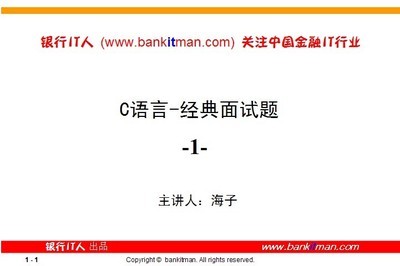面试的时候最怕什么,就是奇葩的问题,让人措手不及,悔不当初没有好好读脑筋急转弯。
Most people’s biggest job-hunting fear is being put on the spot by oddball interview questions such as these (which are real):
“Describe the color yellow to someone who’s blind.”
“请向盲人描述一下黄色。”
– Spirit Airlines
“If you were asked to unload a 747 full of jelly beans, what would you do?”
“如果你要给一架装满软糖的飞机卸货,你怎么做?”
– Bose
“Who would win in a fight between Spiderman and Batman?”
“蜘蛛侠和蝙蝠侠谁更厉害?”
– Stanford University
类似于“把大象装冰箱里需要几个步骤”这种问题,小编真心无力吐槽。
Offbeat questions are nearly impossible to prepare for, and they don’t achieve the interviewer’s objective—to test out-of-the-box thinking and the ability to perform under pressure. That’s the bad news.
不过最近的一项调查显示现在这样的面试问题越来越少了。即便像谷歌这种公司也放弃了问奇怪的问题。
The good news is that companies are moving away from them. Recent research shows these questions do little more than boost the interviewer’s confidence. Even companies famous for oddball questions are abandoning them. In the words of Laszlo Bock, Google’s HR chief:
"If you’ve heard that Google likes to pose brain-teaser questions to candidates—like why manhole covers are round—your information is out of date. There’s no evidence that they suggest how people perform on the job."
“如果你还以为谷歌喜欢用奇葩问题刁难面试者,那你就太过时了。”
美国招聘网站总结了面试中最常遇到的50个问题,要面试的童鞋都来学习一下吧~
A Glassdoor study of tens of thousands of interviews found the 50 questions you're most likely to be asked in your next interview:
1. What are your strengths?
2. What are your weaknesses?
3. Why are you interested in working for us?
4. Where do you see yourself in 5 years? 10 years?
5. Why do you want to leave your current company?
6. What can you offer us that someone else can't?
7. Why was there a gap in your employment between these two dates?
8. What are three things your former manager would like you to improve on?
9. Are you willing to relocate?
10. Are you willing to travel?
11. Tell me about an accomplishment you are most proud of.
12. Tell me about a time you made a mistake.
13. What is your dream job?
14. How did you hear about this position?
15. What would you accomplish in the first 30/60/90 days on the job?
16. Discuss your resume.
17. Discuss your educational background.

18. Describe yourself.
19. Tell me how you handled a difficult situation.
20. Why should we hire you?
21. Why are you looking for a new job?
22. Would you work holidays/weekends?
23. How would you deal with an angry or irate customer?
24. What are your salary requirements?
25. Give a time when you went above and beyond the requirements for a project.
26. Who are our competitors?
27. What was your biggest failure?
28. What motivates you?
29. What’s your availability?
30. Who’s your mentor?
31. Tell me about a time when you disagreed with your boss.
32. How do you handle pressure?
33. What is the name of our CEO?
34. What are your career goals?
35. What gets you up in the morning?
36. What would your direct reports say about you?
37. What were your bosses’ strengths/weaknesses?
38. If I called your boss right now and asked him what is an area that you could improve on, what would he say?
39. Are you a leader or a follower?
40. What was the last book you read for fun?
41. What are your co-worker pet peeves?
42. What are your hobbies?
43. What is your favorite website?
44. What makes you uncomfortable?
45. What are some of your leadership experiences?
46. How would you fire someone?
47. What do you like the most and least about working in this industry?
48. Would you work 40+ hours a week?
49. What questions haven’t I asked you?
50. What questions do you have for me?
尽管这些问题没有像“蜘蛛侠大战蝙蝠侠”那样有趣,但是准备好回答这些问题对你来说真的很重要喔~
Though these questions may be less exciting to prepare for than “Spiderman vs. Batman,” they are what you need to be ready for.
Most interviewees are only prepared for about 10 questions, so this list alone can give you a leg up. Study the list carefully and have answers ready—but not robotically rehearsed—so that you can speak comfortably, flexibly, and confidently about each of these topics.
(By Dr. Travis Bradberry)
注:更多精彩文章请关注爱华求职面试技巧栏目。
 爱华网
爱华网



